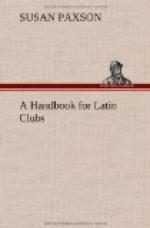—John Addington Symonds
HECTOR AND ANDROMACHE
Andromache
Will Hector leave me for the fatal plain,
Where, fierce with vengeance for Patroclus slain,
Stalks Peleus’ ruthless son?
Who, when thou glid’st amid the dark abodes,
To hurl the spear and to revere the gods,
Shall teach thine Orphan One?
Hector
Woman and wife beloved—cease thy tears;
My soul is nerved—the war-clang in my ears!
Be mine in life to stand
Troy’s bulwark!—fighting for our
hearths, to go
In death, exulting to the streams below,
Slain for my father-land!
Andromache
No more I hear thy martial footsteps fall—
Thine arms shall hang, dull trophies, on the wall—
Fallen the stem of Troy!
Thou go’st where slow Cocytus wanders—where
Love sinks in Lethe, and the sunless air
Is dark to light and joy!
Hector
Longing and thought—yea, all I feel and
think
May in the silent sloth of Lethe sink,
But my love not!
Hark, the wild swarm is at the walls! I hear!
Gird on my sword—Belov’d one, dry
the tear—
Lethe for love is not!
—Schiller
ENCELADUS
Under Mount Etna he lies,
It is slumber, it is not death;
For he struggles at times to arise,
And above him the lurid skies
Are hot with his fiery breath.
The crags are piled on his breast,
The earth is heaped on his head;
But the groans of his wild unrest,
Though smothered and half suppressed,
Are heard, and he is not dead.
And the nations far away
Are watching with eager eyes;
They talk together and say,
“Tomorrow, perhaps today,
Enceladus will arise!”
And the old gods, the austere
Oppressors in their strength,
Stand aghast and white with fear
At the ominous sounds they hear,
And tremble, and mutter, “At length!”
Ah me! for the land that is sown
With the harvest of despair!
Where the burning cinders, blown
From the lips of the overthrown
Enceladus, fill the air.
Where ashes are heaped in drifts
Over vineyard and field and town,
Whenever he starts and lifts
His head through the blackened rifts
Of the crags that keep him down.
See, see! the red light shines!
’Tis the glare of his awful eyes!
And the storm-wind shouts through the pines,
Of Alps and of Apennines,
“Enceladus, arise!”
—Henry W. Longfellow
NIL ADMIRARI
When Horace in Venusian groves
Was scribbling wit or sipping “Massic,”
Or singing those delicious loves
Which after ages reckon classic,
He wrote one day—’twas no vagary—
These famous words:—Nil admirari!




